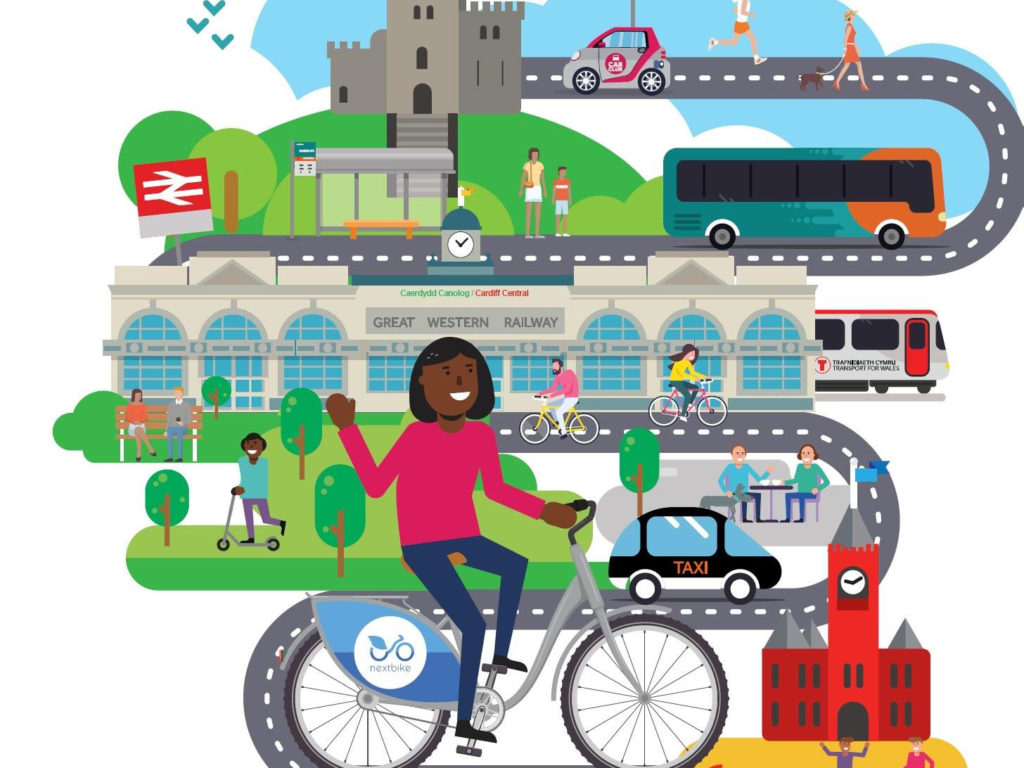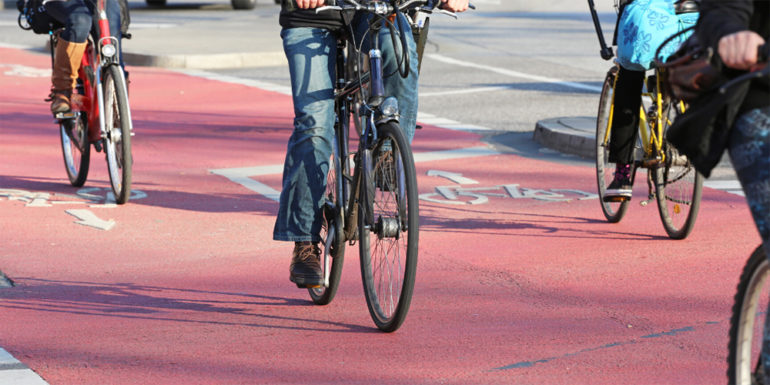More cycling and walking routes linked to better public transport network among Sustrans Cymru ideas for a sustainable future
AHEAD of the Senedd elections later this year, charity Sustrans is asking the next government to focus on walking and cycling in towns and cities.
In their 12-point manifesto, Sustrans outline the necessary steps to reduce the impact of cars and increase opportunities to walk and cycle around cities.
The charity say that active transport is one of the best ways to improve air quality in cities.
Christine Boston, Director, Sustrans Cymru, said: “Active travel can offer a solution to many of the crises we face – the current public health crisis, the climate emergency, air pollution, obesity, social inequality and more. Increasing the number of people who cycle and lessening people’s dependency on the car has the potential to alleviate these crises.
“We know that Cardiff faces significant challenges when it comes to poor air quality and the effects of traffic congestion. Reducing the number of cars on our roads is the quickest and most effective way of cleaning the air we breathe and reducing our impact on the climate emergency.
“In order to make it an easy option for people to leave their cars at home and ensure access for all, we need to see good quality walking and cycling infrastructure, linked up to an accessible, reliable and affordable public transport system.”
The suggestions come at a time when Wales begins to focus on the climate crisis. Wales’ National Forest, expected to start development this year, is one scheme designed to improve air quality across the nation.
But campaigners say that there is more to be done in Wales’ cities to reduce levels of air pollution.
The full manifesto includes:
Investing in safe and healthy travel
- Dedicate at least 10% of the total transport budget for active travel, including provision for local authorities to be equipped to deliver on the Active Travel Act and a revenue funding stream for behaviour change.
- Create a separate capital fund of £20m each year for the development and improvement of the National Cycle Network to ensure it is fully accessible for everyone.
Inspiring future generations to walk and cycle
- Ensure every child in Wales has access to a cycle, and free cycle training.
- Set up a programme for School Streets embedded within neighbourhoods that enable children to independently travel to and from school.
Create a Wales of 20-minute neighbourhoods
- Help local authorities create towns and cities that put people first by making 20-minute neighbourhoods a central principle in local planning, transport, health and economic policy which involves being able to get everything you need within 20 minutes of your home.
- Apply the sustainable transport hierarchy to all transport and planning policy and investment decisions to ensure Wales prioritises people and their access services, while reducing car dependency.
Transport for everyone
- Prioritise sustainable transport options by fully integrating walking and cycling with the wider public transport network, ensuring it serves all users equitably.
- Ensure 20mph speed limits are implemented by 2023 as the default speed limit in all built up areas and pavement parking is banned across Wales.
- Legislate for a Clean Air Act within the first term of office.
Access to nature
- Establish a National Greenways Programme to provide better access to nature for everyone across Wales.
Delivering Success
- Improve the diversity of representation on the Active Travel Board and raise the status of the Board to a Commission that is able to hold the Welsh Government to account.
- Set challenging targets for active travel and conduct an annual high-quality National Transport Survey to evaluate success.
A Welsh Government spokesperson said: “We have a strong track record in responding to the climate emergency and investing in alternatives to car transport.
“We have increased our investment in active travel and public transport, including the development of new metro systems. We have published our new transport strategy, Llwybr Newydd, which commits to major reductions in emissions, shaping investment towards green travel and creating a transport system with convenient alternatives to the car. We have also set out our commitment to delivering a Clean Air Act.”
Cardiff Council published its Transport White Paper last year, where they identified projects which will change public transport across the city.
The changes include:
- Expanding current Metro plans to deliver more new tram/train routes and stations in Cardiff and the region
- Introducing new Bus Rapid Transit services and Park & Ride sites
- Lowering the cost of bus travel significantly
- Delivering safer walking and cycling routes
- Offering travel options designed to get people out of their cars and onto public transport.

The council say that these plans will require a partnership with the Welsh Government, as well as Transport for Wales and other regional bodies. The estimated £2bn cost may be partially funded by a daily charge to road users, which could have an exemption for Cardiff residents.
This scheme would require visitors to pay to drive across the city, a move that the council hopes will encourage a switch to public transport.
Council leader Huw Thomas said: “The future success of Cardiff hinges on getting transport right in the city. There can’t be anyone who is happy with the current state of affairs which is why we are bringing forward this ambitious 10-year vision and why we are beginning an honest conversation about how it’s paid for.”
In recent years, it has become obvious that air pollution has a major impact on the health and welfare of people across the world. Those living in cities are affected more than country-dwellers.
Fiona Kinghorn, Executive Director of Public Health for Cardiff and Vale University Health Board said “If we are serious about improving air quality, getting people more active, and tackling the climate emergency, ambitious action is required.
“This White Paper delivers that, and we fully support its ambition to increase walking and cycling in Cardiff, provide major enhancements to the public transport network in the City, and reduce harmful air pollution.”
The council plan to build a safe and fully segregated cycle network by 2026, which continues the improvements made in recent years across the city.
The system will include a complete cycle loop around the city centre, meaning that cyclists will no longer have to brave major roads or cycle in pedestrian zones. In addition, the cycleways connected to this loop will lead to a number of districts across Cardiff.



